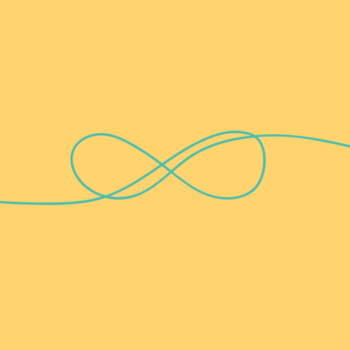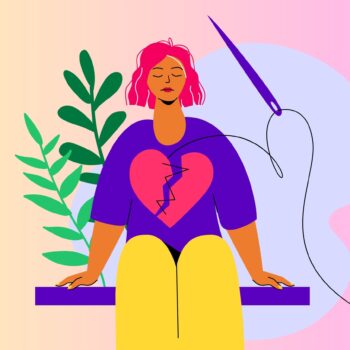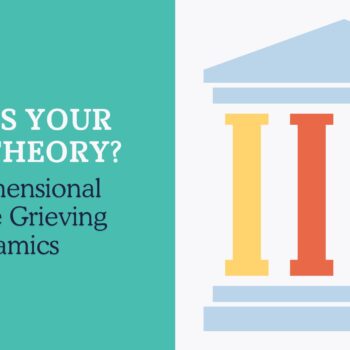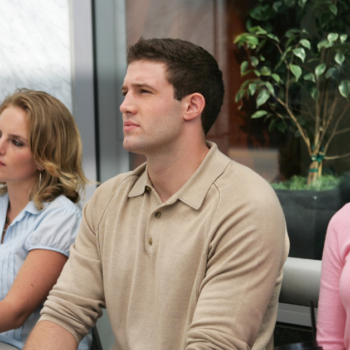Stop Trying to Heal from Grief
/ General : Litsa
For further articles on these topics:
I know this might sound controversial. Or, at minimum, unexpected from a grief writer and therapist. If you’ve spent any time on #grieftok or #griefstagram you’re probably all too familiar with messages about ‘healing from grief’. You’ve likely scrolled the hundreds of grief influencer videos promising to help you ‘recover from grief’ or ‘heal your grief’ via retreats, essential oils, coaching sessions, classes, and Facebook groups (all while making green juices in their pristine William Sonoma kitchens). ‘Unhealed grief’ and ‘unrecovered grief' are talked about like some sort of boogeyman, hiding under our beds waiting to grab our ankles and hold us down as we try to emerge from the rubble of loss.
Every time I hear this language I cringe.
Language and Thought
We like to believe that language describes our thoughts. But the reality is far more complex. Language can describe thoughts, but it also creates and shapes our thoughts. Philosophers had long speculated that how we speak constructs our realities. Ludwig Wittgenstein famously said “The limit of my language is the limit of my world”. In recent years, modern science has provided us with overwhelming evidence that these philosophers and linguists were right.
Research has found that differences in native languages mold the ways people see and understand the world. This applies to concepts as fundamental as space, time, color, and even eye-witness memory of events. Though I am tempted to go on a tangent explaining all the research, in the interest of (relative) brevity I’ll ask you to either trust me on this or go and read about it on your own. I do recommend it – the way language shapes thought is fascinating stuff. And if you're not up for reading more, this short video is an interesting, quick example.
You Don’t Need to Heal Your Grief
We are far from the first to suggest this. Let's go back one hundred years to Freud. Now, this is a man who said some things about grief that we take serious issue with. But even he was assuring people that grief is not a problem or a pathology. He understood it as a normal human process. In Mourning and Melancholia he says, " It is also well worth notice that, although mourning involves grave departures from the normal attitude to life, it never occurs to us to regard it as a pathological condition and to refer it to medical treatment."
He contrasts mourning with melancholia (what we would now call depression), which he sees as a pathology that does require intervention. Mourning, on the other hand, he describes as a natural, transformational process after loss (granted he thinks it makes us ultimateley "free and uninhibited". That's not how we'd describe it. We're cerntainly not team-Freud here. But it is important to note that he, a man who pathologized many, many things, saw grief as a normal, transforming process).
For the last fifty years, mental health and grief experts have been trying to help people understand that grief is not something we need to heal from. Rather, grief IS the healing. Though we're not fans of the five stages of grief, for reasons we’ve shared many times, there is a passage that I have always appreciated from David Kessler in the Afterword of his book with Elisabeth Kubler-Ross, “On Grief and Grieving”.
“There is wonder in the power of grief. We don’t appreciate its healing powers, yet they are extraordinary and wondrous. It is just as amazing as the physical healing that occurs after a car accident or major surgery. Grief transforms the broken, wounded soul, a soul that no longer wants to get up in the morning, a soul that can find no reason for living, a soul that has suffered an unbelievable loss. Grief alone has the power to heal.”
Kubler-Ross & Kessler, On Grief and Grieving
Grief is Not a Wound
When we grieve, it is because we have experienced a devastating and unimaginable loss. That loss is what has shattered us. Grieving is our normal and natural human response to that loss. It is the physical, emotional, cognitive, relational, existential, spiritual experience we all go through, in varying degrees and in various ways, after a loss. Grief and grieving are not the source of our pain. The source of the pain is the loss itself.
Grief is how we process this loss. After loss we open our eyes to a world that in no way resembles the world we once knew. In this new world, grief is how we come to understand who we are, how we feel, and how we will survive in this new world. In grieving we create a relationship with a person who died. We develop the continued bonds that will evolve with us as we move forward in a world without that person. Grief allows us to turn inward and assess what we need from ourselves and others in this life after loss. It has the power to clarify our values and our priorities. In grief we begin to make sense of who we are in a world without a person who defined us.
Grief is the Healing
Perhaps it sounds like semantics, my saying we don’t need to “heal from grief”. Especially when I so strongly believe that we heal through grief, that grief is healing. But I think it is far more important than semantics. If the language I hear early after my loss is that I must ‘recover from grief’ or ‘heal from grief’, I see grief as an adversary. That language molds my understanding of grief itself, seeing it as a problem. Or worse, as a threat, something that has in and of itself caused harm, a thing to escape. It is no surprise that I might then avoid my grief. Or I might interpret signs of ongoing grief as a sign of failure.
If I hear, early after my loss, that we ‘heal through grief’ or that ‘grieving is an ongoing and evolving process of healing’, my understanding of grief is shaped in a fundamentally different way. Grief is no longer my adversary, a boogeyman hiding under the bed. Instead of something to escape, battle, or eliminate, grief is a companion. And when I am no longer fighting against my grief, I am able to invite it in. I can listen to what it is teaching me about myself, about those I’ve lost, about how to live in this new world.
Grief as Companion
I understand that grief is the keeper of my most treasured memories and continued bonds. Grief is a trusted friend (albeit a cranky and temperamental one). The memories and bonds that live in my grief are what gives me the confidence that I can, slowly, rebuild. Knowing grief is a companion is what allows me to move forward without fear of “moving on” or “letting go”.
On a triggering birthday or anniversary years on, when my grief sidles up beside me and brings on a cascade of tears, I am not surprised or scared. I don’t fear that I failed to ‘recover’ or ‘heal’ properly. Quite the opposite. I am grateful that I can still welcome grief in. We can share old memories and revisit the life I once believed I'd live, while still appreciating the life I am living. I am happy to let grief put her arm around me, to bury my face in her shoulder as I cry, knowing that together we will always be healing.
We wrote a book!
After writing online articles for What’s Your Grief
for over a decade, we finally wrote a tangible,
real-life book!
What’s Your Grief? Lists to Help you Through Any Loss is for people experiencing any type of loss. This book discusses some of the most common grief experiences and breaks down psychological concepts to help you understand your thoughts and emotions. It also shares useful coping tools, and helps the reader reflect on their unique relationship with grief and loss.
You can find What’s Your Grief? Lists to Help you Through Any Loss wherever you buy books:





JENNIFER July 11, 2023 at 1:10 pm
My favorite line from your article was this one “In grief we begin to make sense of who we are in a world without a person who defined us.”
My beloved husband died 16 years ago in our 21st year of marriage. Our relationship was my anchor in the world and losing him threw me into an existential crisis. How do you learn to carry on after you lose the person you thought you could not live without? Despite how I felt, I had to learn. I was left with three children ages 10, 14 & 16 to raise alone. Was it awful? Yes. I cried every day for the first 2 years. Many who commented on your article perfectly describe the confusion, sadness, depression and grief of the earliest years after his funeral.
And yet, there is hope for each of us who have endured grief. Only recently have I reflected on the personal growth that resulted because it was forced upon me. After my husband died I saw myself as having the choice to either adapt and try to heal or fold inward and allow my spirit to slowly wither. Though still struggling to cope with grief, I began doing annual personal challenges in my husband’s memory – embracing life sorts of things like getting a motorcycle license, going back to school and becoming a nurse, taking a public speaking class. It has taken more years than I would have imagined but ultimately these challenges helped me create a new life that is fulfilling.
When I was newly widowed I wish I had known another widow who could have given me the reassurance I will now gladly give others I meet who are in grief. My heart goes out to you. You will always miss your person, but a different sort of life is possible that can be satisfying in its own way. Sending you wishes for courage and strength as you process your grief.
Xcinia June 2, 2023 at 5:57 pm
I’ve felt like this all my life – but bowed to those who had more learning. Now that I’m dealing with 60 years of CPTSD – life is a constant Grief – everywhere I turn. But it’s burning away the pain from my childhood and I’m able to see that I’ve learned much more that I ever thought I’d be able to.
Dama Holmen May 30, 2023 at 5:45 pm
I liked this article very much. My husband died in March after 30 years together. I’m experiencing a sort of reverse-grief dilemma from what you described in your piece: I didn’t grieve very much at all. He had an amazing, long life and a good death. He was not the easiest person to live with as he grew older, altho he was very high-functioning into his last years. We had both experienced a great deal of trauma as younger people, and tho we had good times, the relationship was challenging, to say the least.
I was a medical instructor for some time, and I was at peace with the way his death unfolded, and honored to be there with him.
But….. I can’t remember when I’ve been happier. I’m okay financially, tho he left me with a real job estate-wise. I can do some much needed work on the house, travel and socialize as I wish… He was very well respected and loved in his field, and I find myself saying, when people console me for my loss, I’m okay. Really, really okay! It seems a little awkward sometimes.
He had many admirable qualities, but if he had lingered longer… So glad he didn’t.
I wish the revered Kubler-Ross stages of grief had not become such boilerplate psychobabble. I, too, am a fan of the concept of ‘ambiguous loss’ as articulated by Dr. Boss. We haven’t all been devastated when a spouse dies by the loss of a great love of our lives. Marriage is a twisted tree, and it can be a relief to become disentangled.
Karen shuttleworth May 29, 2023 at 7:16 pm
I just read”Stop Trying to Heal From Grief. My husband of 56 years died 2 years ago. We shared almost all of our interests and rarely spent any length of time apart. Needless to say I’ve been beating myself up about not getting on with getting on. It’s only in the last several weeks that I’ve been edging in on normal. I can now concentrate,retain,read,and not feel so alone and lonely. I think that during the past two years I intellectually had some idea of what was happening. But with no map for finding my way. I think it takes a lot of time to accept what’s happening and be able to move. However, the paragraph on weekends and holidays made me cry both for my sadness but for all of the others sharing this rugged ,treacherous road
Ira Weissman May 29, 2023 at 1:31 pm
Thank you . I’ve been trying to tell this to close friend since it mirrors my own grief and mourning experience in the years since I lost my wife of over 40 years but I do not know how to approach this with creating pushback and resentment
Maybe it’s not my place
Jan J May 29, 2023 at 10:15 am
I always read your blog posts with great interest. They are very helpful to me. I have lost some loved ones when they died. But the loss that hurts me the most is when the love of my life went through a sudden personality change that was sort of like a mental breakdown. After years of happily talking about spending the rest of our lives together, he suddenly walked out of my life without warning and never spoke to me again. He didn’t even come back to get his belongings. An incompetent, spiteful, and highly unethical therapist played a huge role in my partner’s leaving. I have looked for year since then, hoping I would find someone else I could share love like we shared – I have finally pretty much given up. So this wasn’t a death but it was a massive loss that still affects me. You mentioned Dr Pauline Boss and her work on ambiguous losses and I have found that helpful too. Thank you
Pat Leeck May 29, 2023 at 9:01 am
Thank you so much for this article. It’s been about 13-1/2 months since my wife of 36 years has passed away. I still talk to her every night in bed and cry many days and nights. I had the feeling that I was not adjusting properly that i was week, because of the time since she died and me still crying a lot. But after reading your article I believe I am doing ok, because I can see myself getting better, but knowing I still have a long way to go and that’s ok.
Thank you……..Pat
Peter. May 29, 2023 at 8:49 am
Reading the emails and articles l received l find they help a great deal. I lost my partner to cancer some three years ago. She was 56 years of age.
Like many other l am now in a world I didn’t think l would be in. Best wishes Peter. From the 🇬🇧United kingdom 🇬🇧